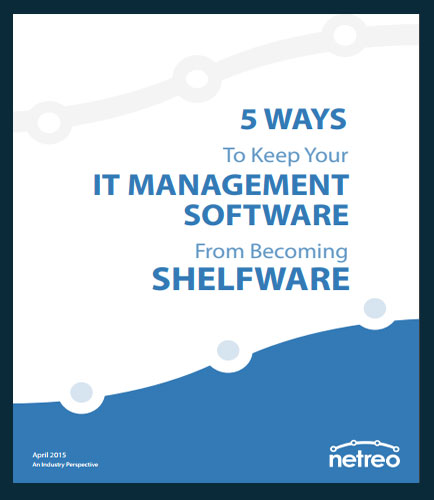
PROCESSING. PLEASE WAIT...

White Paper: Netreo
It’s all too common to see IT management software at the top of the heap for shelfware. We've been able to identify some of the leading causes that prompt companies to abandon these (often significant) software investments.
84% of companies are paying for SHELFWARE!!
Read this whitepaper on “5 ways to keep your IT management software from becoming shelfware” that outlines the following 5 key pointers you can use to keep your IT management software investment producing positive returns:
Too many alerts are worse than not enough in the new IT management software
Don't make people go to multiple places to gather information
Keep the interface simple and fast to avoid your IT managment software become shelfware
Minimize administration from becoming shelfware
Don't buy management software:How to ensure that IT management software purchases don’t become shelfware.

By: StarLeaf
Skype for Business is fast becoming the most widely-used single vendor unified communications platform. However, as the enterprise implements Skype for Business, it hits a seemingly impossible barrier, realizing complete video communication and collaboration. There is no easy or elegant way for existing video conferencing equipment to seamlessly integrate with Skype for Business. This whitepaper addresses what the available migration strategies for video calling and conferencing are, and how interoperability between Skype for Business and professional video systems can be achieved for inter and intra-company calls. It highlights: How to bridge the gap between Skype for Business and legacy H.323 meeting room systems on a scheduled meet-me basis ‘Do nothing’ strategy- Both the video conferencing rooms and Skype for Business are maintained in parallel How to achieve direct calling and conferencing for all, while maintaining current legacy room systems, registered directly to the video cloud
By: KINGSTAR
OEMs traditionally used DSP-based hardware, plugged into a PC, for motion control. But new software-based solutions have challenged this approach, claiming equal or better performance at lower cost. How does soft motion really compare to hardware? In this whitepaper, we break it down component-by-component for a down-to-the-dollar cost and performance comparison. Topics covered include: Challenges with the traditional hardware approach How soft motion solves those challenges Performance comparison: calculations, axis control, adding axes and machine vision Cost comparison cost and length, ability to scale, necessary hardware Cost-per-item breakdown showing that soft motion costs 44% less than hardware Learn how software-based motion control actually compares to hardware with real-life scenarios and real-dollar cost comparisons. If you’re considering soft motion, start here.


 2025 All Rights Reserved | by: www.ciowhitepapersreview.com
2025 All Rights Reserved | by: www.ciowhitepapersreview.com